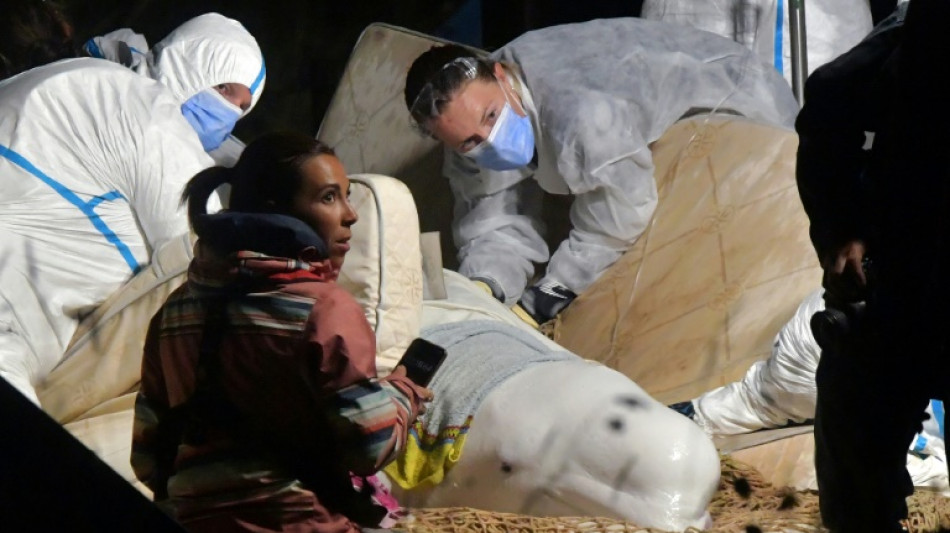

Stranded beluga whale rescued from France's Seine river
A beluga whale stranded in the river Seine in northern France for more than a week was removed from the water early Wednesday in the first stage of an ambitious rescue operation to return it to the sea.
After nearly six hours of work by divers and rescuers, the 800-kilogram (1,800-pound) cetacean was lifted from the river by a net and crane at around 4:00 am (0200 GMT) and placed on a barge under the immediate care of a dozen veterinarians, AFP journalists said.
The beluga, a protected species usually found in cold Arctic waters, will next be placed in a refrigerated truck and transported to the coast, Isabelle Dorliat-Pouzet, secretary general of the Eure prefecture, said ahead of the rescue operation.
"The truck will be refrigerated, at a temperature suited for the animal, humidity, a certain type of comfort, so there is no risk of asphyxiation," Dorliat-Pouzet said.
The four-metre (13-foot) whale was spotted more than a week ago heading towards Paris and was stranded some 130 kilometres (80 miles) inland from the Channel at Saint-Pierre-La-Garenne in Normandy.
Since Friday, the animal's movement inland had been blocked by a lock at Saint-Pierre-La-Garenne, 70 kilometres northwest of Paris, and its health had deteriorated after it refused to eat.
But its condition was "satisfactory", Isabelle Brasseur of the Marineland sea animal park in southern France, Europe's biggest, told AFP earlier on Tuesday.
A seawater basin at a lock in the Channel port of Ouistreham has been readied for the animal, which will spend three days there under observation and treatment in preparation for its release into the open sea.
"There it will, we hope, have a better chance of survival," NGO Sea Shepherd France, which is assisting the operation, said.
The beluga will be taken onto the high seas and released "far enough away from the coast" to regain its rightful place in nature, Dorliat-Pouzet said earlier.
- 'A great day' -
"Today is a great day for this beluga whale and for everyone involved in its rescue," Sea Shepherd said on its website.
The "exceptional" operation to return it to the sea is not without risk for the whale, which is already weakened and stressed, said Brasseur, part of a Marineland team sent to assist with the rescue.
"It could be that he dies now, during the handling, during the journey or at point B," in Ouistreham, she said.
The 24 divers involved in the operation and the rescuers handling the ropes had to try several times between 10:00 pm and 4:00 am to lure the animal into the nets to be lifted out of the water.
As preparations for the operation got under way, people gathered along the banks of the river to observe their progress.
"I'm hopeful that he will reach the sea and that he will not end up like the orca," said Isabelle Rainsart, referencing a killer whale that was spotted in the Seine in May but later died.
"We will wait to see how the transport goes, but we may have already succeeded in the hard part," added Rainsart, who first filmed the beluga on August 2 from her garden overlooking the river.
Interest in the beluga's fate has spread far beyond France, generating a large influx of financial donations and other aid from conservation groups as well as individuals, officials said.
While belugas migrate south in the autumn to feed as ice forms in their native Arctic waters, they rarely venture so far.
The trapped whale is only the second beluga ever sighted in France. The first was pulled out of the Loire estuary in a fisherman's net in 1948.
J.Bergmann--BTB




